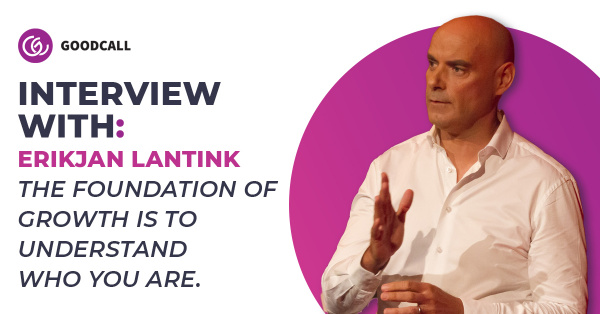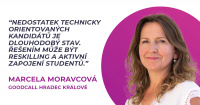Interview with Erikjan Lantink - Interim leader, TEDx Speaker, Leadership Coach
- Autor článku Kateřina Wendeling
- Publikováno v English articles
- Číst 4333 krát
- velikost písma zmenšit velikost písma zvětšit velikost písma
- Tisk
- Buďte první, kdo napíše komentář!
Have you ever gone to a job interview where they asked you the dreaded “Where do you see yourself in 1, 5 or 10 years” question and you had no idea what to say? It might have been just a cliché question from a recruiter who didn’t care about the answer. But if it did matter, what does your answer say about you? Yes, we try to live in the present, but can we really do that right if we have no vision of what we are heading towards? As Erikjan Lantink says: ‘Better starts with who’. Whether you are an executive, manager or a fresh graduate, knowing yourself, your goals, needs and passions is the key to growth, development and overall, a happy work and personal life.
Erikjan was a food retail executive for 17 years, living and working in the Netherlands, Belgium, the United States and across CEE. He spent those years in executive roles in general management, retail operations, HR and organizational development. Nowadays, he is self-employed, living in Prague and dedicates his time to helping people, most often leaders, to become the best version of themselves. He does that through projects, coaching and his regular newsletter where he shares his insights on growth, leadership, motivation, goals, mindset and much more.
‘Better starts with who’ is a phrase you commonly use. Can you explain what's behind it?
If you’re looking for more and better, begin by asking yourself a few questions. Who am I? You will be surprised how few people can give a good answer to that question (I’m not talking about your name here). What drives you? What are your values? What do you love to do? What makes you creative? The foundation to growth - and that’s what it’s all about - is to understand who you are. When you truly know who you are and what drives you, you’ll find it easy to discover a purpose for yourself. Once you know all that, your growth is happening. Therefore, better starts with who.
How did you come up with the phrase? Was there a point in your career when you needed to take a step back and figure out what you want?
By nature, I’m a very reflective person. A quote that I live by is your life is too short to let it go to waste. I think when you start a new job, and this is something I’ve always done quite well in my career, you need to have a rough idea where you want to be 3 years from now. You need to understand what you are trying to accomplish, how do you want to grow, and what options are you creating for yourself. Too many people step into a job and leave their growth possibilities with the manager and that’s where I always said that you actually need to turn it around. You need to think through what you want yourself and then have a conversation.
How do you help people become better leaders?
By asking them a lot of questions so I understand what truly drives them. But they will have to let me in. I see right through fake people, so it will need to become authentic quickly, otherwise we’re wasting our time. Then I help them to understand that by asking great questions, they in fact become better leaders. A good leader is curious. If you have somebody in front of you who talks more in statements and asks less questions, you’re not dealing with a great leader. Just watch it. Great leaders are curious and ask questions. Managers talk in statements. All I really do is to facilitate a good conversation. If that happens, people will grow. And then I help them work with their teams by understanding each other and learning how to work together.
What is the most common issue or problem preventing people from becoming better leaders?
Fear. Insecurity. People often behave the way they behave because they’re afraid of something. The biggest bosses often have a lot of insecurity deep inside. They’ve built a successful business and a reputation for themselves, and they don’t want to see that change. They learned that command and control work and that’s how they manage. They lead with fear. Fear builds fear. In my opinion. What I’d like to see is companies where fear is absent, people can be themselves, and people feel safe.
What would convince a manager to become a leader?
That’s the million-dollar question. To me, there are three groups. There is one-third of people that get it, one-third of people that will never get it, and a third group that is a little bit on the fence and that might get it. I’m trying to influence the people that are curious and a little bit on the fence who are wondering: Should I change my management style? Should I do things a little differently? I believe in planting seeds and I think over time people will start to believe that a certain kind of leadership can work. I’m still amazed that so few people understand that if you show good leadership practices and engage the people more, you can create a workplace that people will love.
Can you tell in advance what a company’s management is like when you’re applying for a new job?
First of all, do you get a chance to ask questions about the company at the interview – and are the answers provided thorough and relevant? Am I able to demonstrate my curiosity and are people actually listening to me? Is it a dialogue or a monologue once you talk to the hiring manager or your potential manager? Watch out for the questions to statements ratio. When people talk in statements all the time then I get a little bit suspicious in terms of what that means. Even if you do all your homework, the culture can turn out differently than you expected. You need to really believe in what you can contribute and whether you see appreciation for that on the other side. It’s not just about hiring somebody, it’s about starting a relationship.
During your 25-year career, have you experienced the business shift from “focus on revenue” to “focus on people”?
It’s evolving, but we still have a long way to go. I think revenue and people go very well hand in hand. It’s not one or the other. When leaders help people grow, those people will want to do what’s right for customers, and those customers will enjoy the company and return. That’s how you drive revenue. It’s a simple equation and it actually works. Great leaders understand this. Managers continue to squeeze people and focus on revenue alone.
Do you see some significant differences between leadership styles in the Czech Republic and the Netherlands?
In general, I think there are good and bad leaders in both countries. One could argue that modern leadership is still under development in the Czech Republic, but I’ve seen good and bad examples everywhere. A good leader is curious, asks questions, allows dialogue, does not lead with fear, and helps people grow. If you would press me, I would say that in the Netherlands people could show a little more humility and interest in other people, and in the Czech Republic, people could rely a little less on hierarchy.
What gave you the idea to start your own newsletter?
I love to write, and I have an opinion. I’m also curious, which is why I always end with a question. It’s a fun way to be connected to people.
What do you enjoy about writing the newsletter? Does it give you something?
Firstly, I love to write. Secondly, it helps me to be creative and organize my own thoughts. There is learning for me inside of it. Third, I hope that I can influence some people and potentially work with them.
Is there some final advice you'd like to share?
For every leader: Listen a little more to your people. They have great things to share.
For everybody: If growing yourself is what you’re looking for, start by looking in the mirror.
Here’s a challenge for you: Try to dedicate more self-reflection time for yourself this year to realize your goals, passions and what drives you and see how it helps you to move forward. If you would like to get more insights from Erikjan, you can subscribe to his newsletter and get weekly tips and stories about leadership, motivation, growth and being a better you.


Související položky (podle značky)
Nejnovější od Kateřina Wendeling
- Jak může autentická kampaň změnit firmu zevnitř – případ Effectix a zničené ÁÍčko
- Jak se dělá HR marketing v Česku? 6 rad od vítězů letošních Recruitment Academy Awards
- Konference Happiness@Work Live! slaví 10 let a ukáže, jak vypadá leadership pro budoucnost
- Pouze třetina firem bere employer branding vážně. Většina ho zanedbává
- 9. ročník Recruitment Academy Awards: Ocenění nejlepších projektů v HR marketingu a employer brandingu








